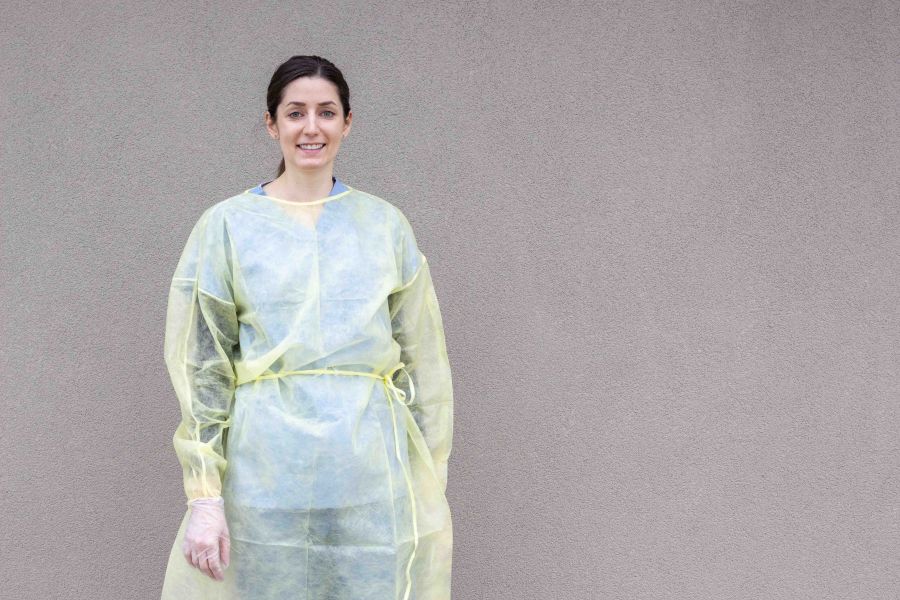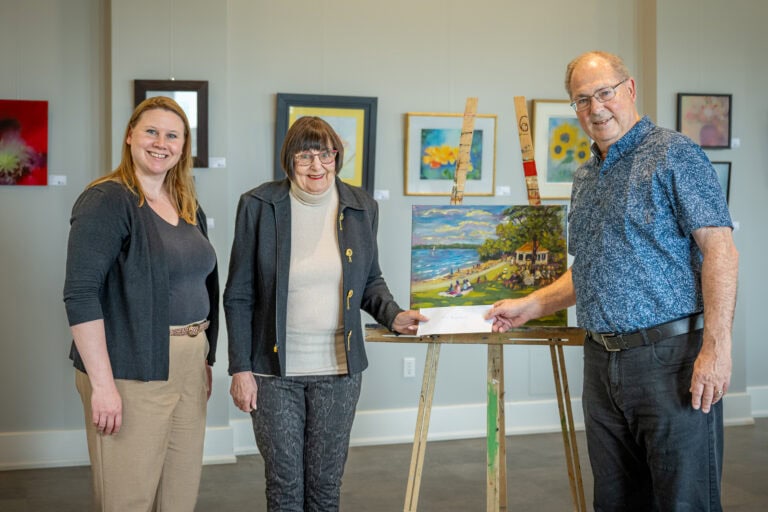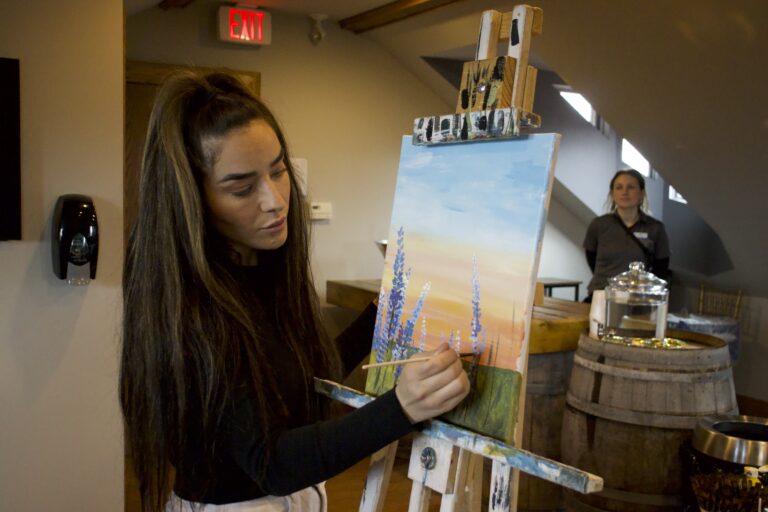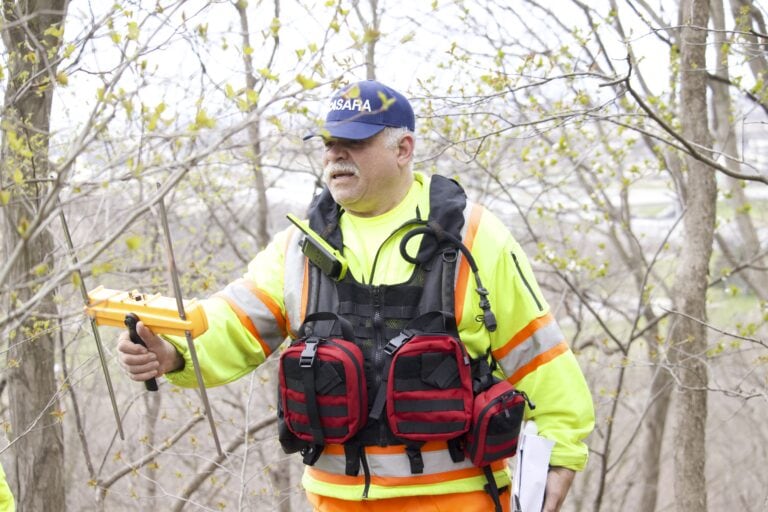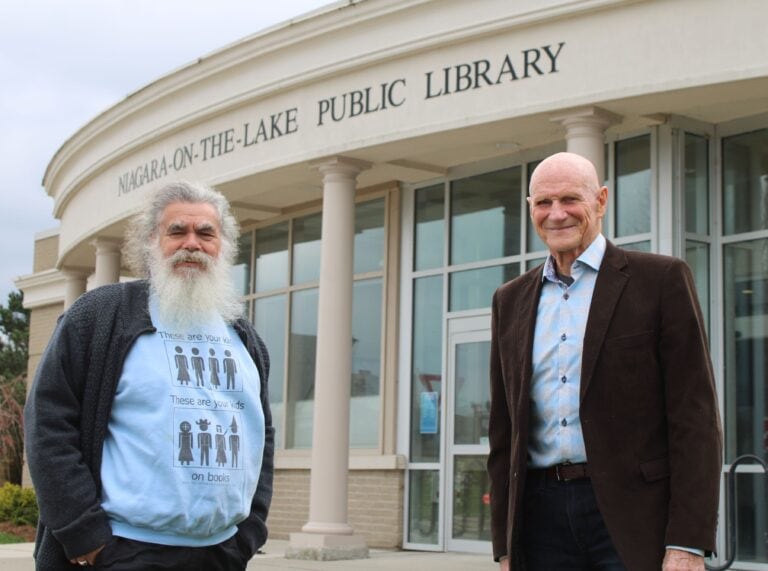This story is the third in a series, profiling all three of Niagara-on-the-Lake’s nurse practitioners. This week’s profile, Elise Suhadolc, is one of two nurse practitioners at Niagara North Family Health Team’s Virgil site.
______________
It’s a new, strange world for nurse practitioners like Elise Suhadolc.
Suhadolc, 34, has been at the Niagara North’s Virgil site almost three years and in that time, there’s been nothing quite like the changes caused by COVID-19.
She’s seeing fewer people in the office and more patients online. And even stranger, it’s now important to ensure people that do come in are “healthy,” even though they are obviously coming to get checked for an illness.
But nurses like Suhadolc are doing what they can to reinvent patient care. They’re using more hand sanitizer than ever before, cleaning down office rooms more regularly and finding ways to keep in touch with patients that might be more at risk.
“There’s definitely a lot less patients walking around, a lot less bodies in the office, and then a lot of checking in on people that maybe aren’t doing so well,” Suhadolc says, during a phone interview with The Lake Report.
Those types of general wellness checks on patients weren’t part of her normal day before COVID-19, but now the clinic is trying to reach out to “individuals who might be at higher risk.”
In her day-to-day life, there’s less mingling with co-workers, with some working from home and others trying to minimize contact.
“There’s a lot less contact, a lot less socializing over lunch breaks. We’re being very careful here, making sure everything’s clean and sanitary, but we’re trying to keep to ourselves as much as possible, just to protect ourselves and the patients that are coming in,” she says.
All around the clinic, they’re going through more hand sanitizer than ever before.
“I mean working in healthcare we’re used to using it pretty regularly, but definitely it’s pretty much every room you go into. You can’t walk too far without being able to access it,” she says.
On top of that, there’s more cleaning going on in the rooms.
But all of those things help remind people of how we should be acting, regardless of a pandemic, Suhadolc says.
“And I think that’s a positive thing, for us to remember what is good practice — to disinfect and to just make sure everyone that’s coming in is healthy,” she says. “And, hopefully, people will be taking some of that and just carrying it forward after this all settles down.”
She says what is a good practice during COVID-19 is also a good practice anytime.
“So, using hand sanitizer, proper hand washing, using hand sanitizer when you’re at the grocery store, staying home when you’re sick, not trying to go to work or go out. You know, the world will still go on. Even if you’re still sick you can stay home for a few days.”
One thing she’s been hearing from patients is they’re thankful they can still receive health care in some capacity, she says.
“Most people have been just positive and have expressed gratitude and thankfulness,” she says.
“I think there’s, rightly so, a bit of cautiousness out there in the community. Everybody is looking out for each other and following recommended practices.”
For patient visits, nurses are using a video platform called OTN (the Ontario Telehealth Network).
“It’s secure, it meets all the PHIPA (Personal Health Information Protection Act) recommendations for privacy issues. So you can speak with them over the camera or just over the telephone if you need to, depending on what they prefer.”
And while sometimes it’s necessary to see people in person, as a phone call can only “take you so far,” she says things have been going smoothly.
“It’s worked out really well so far. You just have to teach people how to use their computer sometimes, how to access their camera.”
The clinic had the capability to do video and phone assessments before COVID-19, though she hadn’t used it before the pandemic.
“Previously it was preferable to see people in person to do a physical assessment,” she says. “It’s new to us, but it’s going well.”
She says the software is “pretty self explanatory” and wasn’t difficult to learn and set up.
“We had a staff member here who was kind of a specialist in this and she taught us all how to use it properly, and then it’s very easy to walk patients through if they have a computer that is up-to-date enough that it has a microphone and a video camera. It’s very easy to access.”
Her biggest concern during the pandemic is if there were to be an outbreak bigger than the Niagara area could handle, and having to make decisions about who can receive treatment.
“We follow the public health website quite carefully. Day to day they post statistics. And you know, definitely the people in Niagara are doing quite well. I don’t think we’re in a dire situation at this point. But I think about Italy and how they have huge numbers of cases and they were having to make life or death decisions about rationing health care, who should get this life-saving medical care and who shouldn’t.”
“I think that’s my biggest worry is if we were to get to a point like that. And we’re definitely not there now, but you know, you’re careful to watch and learn from other countries and other regions, and what’s gone well and what has not,” she says.
She says people who don’t use the clinic often, or don’t have health concerns, might be surprised how easily accessible the clinic remains.
“Doctors, nurses, occupational therapists, our dietitian — everyone is still reachable by telephone, we can do phone consults. We still want people, if there’s an issue, to call us. We still care about your health.”
She says one good thing to come out of this pandemic is a sense of community.
“Honestly, a lot of people that I’ve talked to specifically in this community, in Virgil, Niagara-on-the-Lake, if you’re checking in with them, it seems like there’s a really good sense of community and people taking care of each other. If you talk to people that you might be worried about them going out to get groceries, it’s, ‘Oh no, my neighbours are taking care of that,’ or ‘I have a friend that’s bringing me things,’”
“It just seems like people are reaching out to their elderly neighbours, or their neighbours with new babies. It just seems like everyone’s kind of taking care of each other, which is great.”
She says patients have been gracious in handling the changes in health care. “Everyone’s been great.”
The most heartbreaking thing she’s seen through COVID-19 is the health care providers who have had to make “horrible ethical decisions” about who should get treatment or not.
She also really feels for people who are going through major life events, like having a baby or losing a loved one, who can’t celebrate as normal.
“All those celebrations of life, whether it be birth or death, they’re kind of on hold right now, and that makes me sad for those people, who are wanting to celebrate people and have to find a different way to do it at this time,” she says.
Another heartwarming thing to come of the pandemic, she says, is seeing how children don’t let things like pandemics get them down.
“When you look at little ones, like children, they are just so resilient,” she says. “There is so much chalk art drawn on the sidewalks and the streets in my neighbourhood, and people hanging paintings in their windows and decorating their yards, and I just think that, you know, there’s still happiness, there’s still joy. And sometimes you have to look at the children to remember that you can still be happy during th is time,” she says.
She’s also seen more people out in their neighbourhoods, walking their dogs or getting exercise. She even saw someone walking their goats on a leash.
At home in Port Dalhousie, Suhadolc lives with her partner John. “We just moved in to our neighbourhood last summer,” she says.
Now, with COVID-19, her downtime is less busy than usual, which she isn’t minding.
“Our evenings are really quiet. We’re both working, I’m here full-time still and John works for Brock University, so he’s working from home,” she says.
“But our evenings used to be full of sports or going to the gym or meeting up with friends or continuing education — we’re quite busy, and now it’s nice, it’s a lot slower. We’re definitely into cooking a lot more these days and being more experimental in the kitchen.”
“And then we’re both close with our families, so we’re not able to visit, so a lot more video chats, Zoom evenings with our families and telephone calls.”
She says she’s also had more time to meet neighbours.
“We were so busy and you know, we met a few people, but it’s nice now that — you can’t really get too close, but if someone’s gardening and you’re out doing yard work and you get to talk to people that maybe you haven’t got to talk to yet.”
Right now she’s attempting to learn the guitar, “which is not going all that well,” she says.
“And a lot of finding new shows on Netflix and making sure we still stay active — doing yoga and going for walks,” she says.
Normally she likes to row in the summer, which she hasn’t been able to do this year. “A lot of individual hobbies at this point.”
The thing she misses the most is seeing family.
“I’m OK not going out, you know shopping, going out to restaurants. I feel for our local businesses and we’re trying to support people (by) ordering takeout and still keeping people in business, but I don’t miss going out places. I do miss getting together with people. You can talk to people but it’s different to see them in person and to give my nephew a big hug. That’s what I miss the most.”



